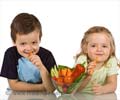
‘Information combined with playful activities and emotional support is beneficial for healthy behavior change in children.
’
Tweet it Now
"Numerous studies have addressed health issues in the school setting, but most have focused on physical activity and nutrition, with little attention to emotional issues such as self-esteem, depression and eating behaviors," said study author Dr Carolinne Santin Dal Ri, a paediatrician at the Institute of Cardiology of Rio Grande do Sul, Porto Alegre, Brazil.The Happy Life, Healthy Heart program randomly allocated ten public schools in the city of Frederico Westphalen, Brazil, to the intervention group (five schools) or control group (five schools). The study included 473 students aged 6 to 12 and 32 teachers. Baseline assessments included weight, height, physical activity, food intake, and health knowledge in children; and physical activity and food consumption in teachers. Measurements were repeated after the intervention was completed.
The intervention had two stages: teacher training followed by students in the classroom. Teachers attended four meetings over a four-month period, were given a booklet, and had access to video lessons. The material was in seven chapters:
- risk factors for cardiovascular diseases in childhood;
- choice of healthy foods;
- food labeling;
- sodium, sugars, and fats;
- emotional health and quality of life;
- physical activity; and
- healthy practices and changes in habits.
Each section contained theory plus suggestions for classroom activities based on the theme, age of the children, and intended goals.
In the classroom, teachers covered one theme per week, including at least one activity. Teachers were free to choose or amend the activities and could incorporate them into projects based on the school's syllabus. To encourage teacher participation, a group was created on a social network where they received messages and reminders from the researcher on the topic they were supposed to work on. Teachers also shared their own experiences. The researcher visited the intervention schools to stimulate teachers and offer guidance.
Advertisement
Both students and teachers benefitted from the intervention. The proportion of students following Brazilian Food Guide advice to avoid pizza/hamburgers and soft drinks increased significantly by 15% and 20%, respectively. In addition, there was a 28% increase in the number of teachers who were physically active.
Advertisement
Source-Eurekalert















